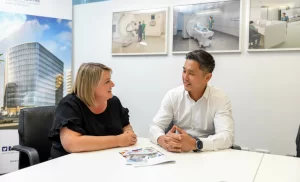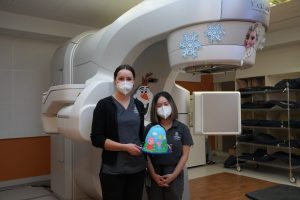A long-term patient study has been quietly keeping track of radiation therapy results in paediatric, adolescent, young adult, and rare adult tumour patients … until now.
Radiation Oncologist at CALHN’s Royal Adelaide Hospital, Associate Professor Hien Le, proudly shares the news that the RAH has recruited its 300th participant into the Australian Particle Therapy Clinical Quality Registry, known as ASPIRE.
“ASPIRE is creating one of the largest international datasets to enable comparison of two types of cancer radiation treatment; the more conventionally used photon treatment, compared to Proton Beam Therapy (PBT).”
“The RAH was our very first site for this project with much appreciated grant funding from The Hospital Research Foundation Group. We are now recruiting patients from across five states and territories.”
“The world’s cancer treatment community are interested in ASPIRE and its findings.”
“A study like this doesn’t just happen, either. It takes not only the work of the researchers themselves but the teams around them to recruit appropriate patients into the study. And this is where the nurses at CALHN’s Royal Adelaide Hospital Radiation Oncology Department have been excellent.
“They have enabled ASPIRE to collect evidence-based research for the comparison of photon and future proton radiation treatments in Australia.
The dedicated ASPIRE recruitment strategy recognises that by collaborating with nursing staff, patient recruitment has increased. This rationale is supported by the National Health and Medical Research Council, the Australian Clinical Trials Alliance, and the Cancer Nurses Society of Australia.
“Patient recruitment began in April 2022, initially just for those undertaking treatments included on the Medicare Benefits Schedule (MBS). However, since the expansion of ASPIRE in January 2024 to include non-MBS treatments, the RAH has seen a significant increase in recruitment,” Hien continues.
“At the RAH, we have gone from recruiting a few patients each month to consistently three or more per week.”
“The contribution of the RAH Radiation Oncology Nurses is critical in building the much-needed evidence to support PBT use for broader cancer cohorts.”

ASPIRE A/Professor Hien Le with Registry Project Manager Kelly Skelton
About ASPIRE
ASPIRE was established in direct response to recommendations from the Australian Medical Services Advisory Committee, in consultation with Department of Health during the application process to have PBT listed on the Medicare Benefits Schedule. The registry is crucial for comparing treatment practices and outcomes of patients treated with conventional Photon Radiation Therapy with future PBT data in Australia, to ensure evidence-based advancements and optimal patient care.
Proudly grant funded by The Hospital Research Foundation Group, and endorsed by TROG Cancer Research Study 21:12, ASPIRE is currently approved to recruit at the following national sites:
- Royal Adelaide Hospital, South Australia
- Alan Walker Cancer Centre, Northern Territory
- Sir Charles Gairdner Hospital, Western Australia
- Monash Children’s Hospital, Victoria
- Canberra Hospital, Australian Capital Territory
Sites pending governance approval:
- Royal Brisbane Women’s Hospital, Queensland
- ICON Cancer Centre, South Australian sites
For more information, please visit the ASPIRE website >



